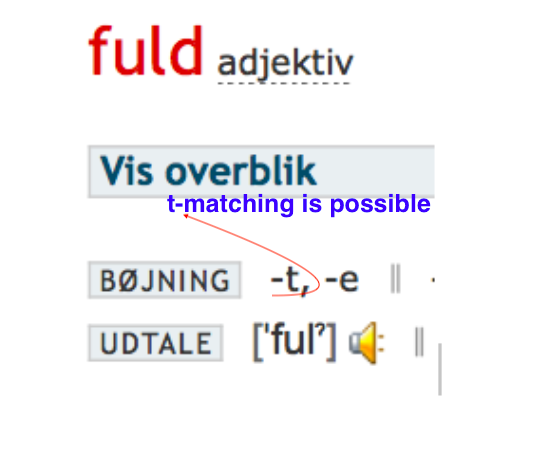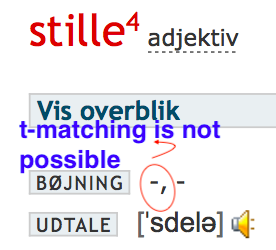sokolova.dk
T-matching of adjectives in Danish
Elena Sokolova, July 24th 2021
In this blog post, you will learn how to use Danish adjectives in front of a countable noun in the singular indefinite form (like ‘a big apple’).
Grammatical gender matching
Danish adjectives usually match the grammatical gender of the noun in the singular indefinite, which they describe. There is no such phenomenon in English. En vej (a way) is of ‘en’ grammatical gender, et bord (a table/desk) is of ‘et’ grammatical gender (you can learn more about it at Gender and grammatical forms of nouns in Danish. So the same adjective ‘lang’ (long) as the majority of the Danish adjectives will take a t-ending to describe an ‘et’-gender noun, like et bord. In other words, Danish adjectives behave differently with ‘en’ and ‘et’ gender nouns in singular indefinite. When an adjective describes a singular indefininte noun of ‘en’ grammatical gender, nothing happens to this adjective, and it is used in its initial dictionary form, also known as ‘n-form’.
It will look like that:
en lang vej = a long way
et langt bord = a long table/desk
When t-matching is not possible?
Adding ‘-t’ to the adjective is a technical matching and should be remembered as a rule. The -t matching of adjectives happens when the noun is in the singular form. Often, this t-matching is called the t-form of the adjective.
As mentioned above, t-matching happens in most cases, but not always, because not all the adjectives are technically able to make the t-matching due to their initial form and phonetic regularities in the language.
See the example for the adjective flot (=excellent/gorgeous):
et flot resultat = an excellent result
en flot præstation = an excellent performance
The adjective flot will behave similarly with et resultat and en præstation, even though the two nouns belong to different grammatical genders. The adjective flot already ends in -t in its initial form, so no t-matching is possible. Due to Danish phonetic rules, the word cannot end in a double consonant letter having no vowel afterwards. So to say et flott resultat*, would be logically correct according to the rule but is wrong in language usage. However, the case is different with ‘fuld’, as it ends in two different consonants, so t-adding is possible.
et fuldt hus = a full house
et fuldt glas = a full glass
Other cases when t-matching is not possible, is when the initial dictionary form of the adjective ends in -e:
en moderne lejlighed = a modern flat
et moderne hus = a modern house;
en stille landsby = a quite village
et stille område = a quite area/neighbourhood
and in -sk/-s
en gammeldags tradition = a old-fashioned tradition
et gammeldags komfur = an old-fashioned stove
en fælles stue = a common/shared room
et fælles projekt = a common projcet
How to predict the behaviour of the adjective?
It is not possible to remember all the adjectives and all their peculiarities. A reliable tip is to learn the noun with its gender, so you will automatically choose the adjective form with a singular indefinite noun. Learn the noun gender group - ‘et’ or ‘en’, and it will pay you off in the correct usage of adjectives. Another way is to check out in the dictionary - especially adjectives, which may not have -t matching.


Do you have questions, comments or suggestions - email to elena@sokolova.dk.